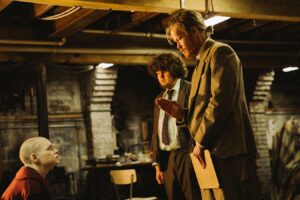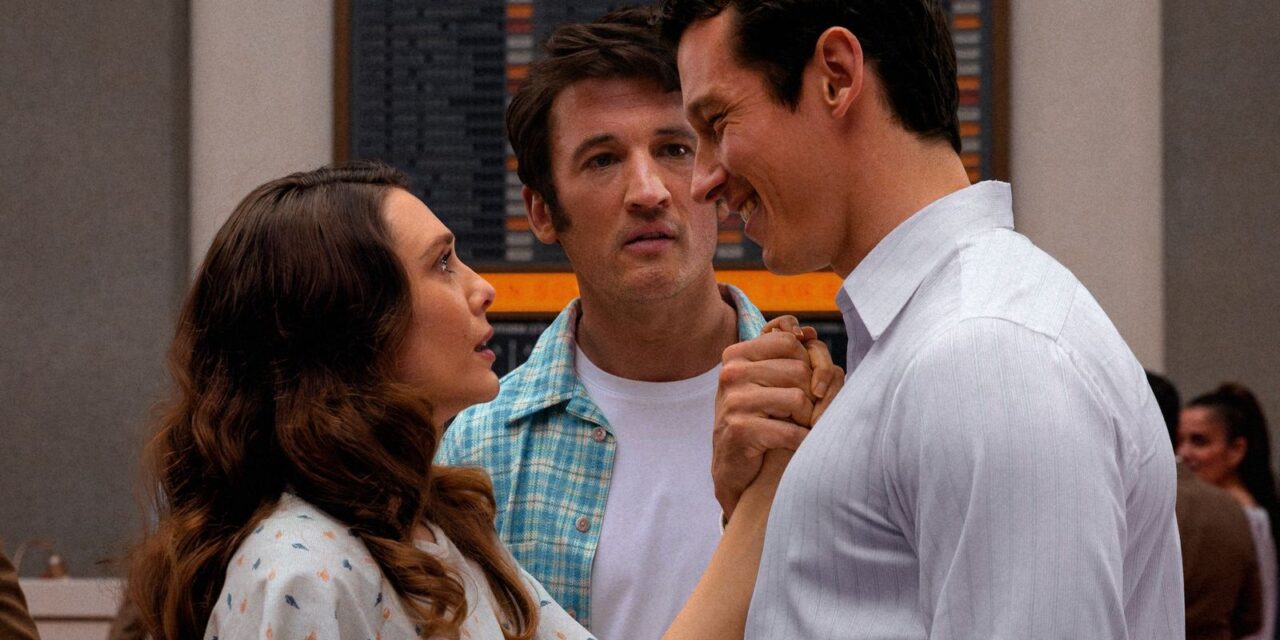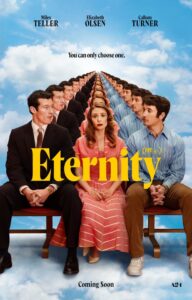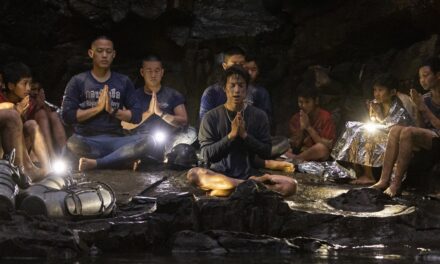What’s Real and What Isn’t?

In an age where distinguishing what seems genuine from something that’s clandestinely veiled, it may be difficult to know what to believe. As a result, we might abandon any attempt to identify inherent (and potentially significant) differences. Or, by contrast, we may become so obsessed with reconciling the truth behind such discrepancies that we descend into a sea of paranoia and conspiracy theories, potentially seeing shadows at every turn and placing ourselves on the sidelines of reality with virtually no credibility to our names. In actuality, the “truth” probably resides somewhere in between, but where and how do we draw the lines of accurate and meaningful distinction? That’s a key question posed in the new darkly satirical comedy-drama-sci fi fantasy, “Bugonia” (web site, trailer).

Michelle Fuller (Emma Stone, left), CEO of a pharmaceutical giant, is kidnapped by a pair of paranoid conspiracy theorists, Teddy (Jesse Plemons, right) and Don (Aidan Delbis, center), who believe she’s an alien out to destroy humanity in the darkly satirical new comedy-drama-sci fi fantasy, “Bugonia.” Photo © by Atsushi Nishijima/Focus Features, courtesy of Focus Features.
Michelle Fuller (Emma Stone) has built a career that has enabled her to become one of the country’s (if not the world’s) most successful CEOs. As the head of the pharmaceutical giant Auxolith, she has positioned her organization on the cutting edge of many diagnostic and therapeutic forefronts. And, because of her accomplishments, including both product developments and DEI initiatives for the company’s workforce, she has earned an apparently well-known and widely regarded reputation for her progressive undertakings, a persona and legacy that she works at constantly to substantiate and perpetuate.
But is this standing truly deserved, or does she simply have a good PR team behind her? While the public seems generally accepting of this esteemed repute, not everyone buys it. That even includes some who are close to her, most notably Teddy Gatz (Jesse Plemons), one of her company’s low-level employees. Having worked inside the company for years, he’s seen things that don’t sit right with him. He doesn’t trust the big boss, believing not only that she isn’t what she claims to be, but that she’s actually the driving force behind something clandestine and exceedingly nefarious.
But is Teddy’s belief true or the result of a paranoid imagination gone wild? What exactly does he think she’s out to accomplish and why? And what, if anything, does he plan to do about it? To understand this, one needs to know something about his background and how he’s cultivated this mindset.
Essentially, Teddy is the walking embodiment of every conceivable conspiracy theory wending its way through cyberspace and alternative media. He has become an ardent proponent for them, becoming a sort of poster child for their contentions. Some of these notions may, admittedly, have a semblance of credibility underlying them, but others are readily perceived as so outrageous that it’s hard to believe anyone could conceive of them, let alone take them seriously. Nevertheless, he’s so on board with them that they positively define the nature of his prevailing outlook.
In particular, Teddy believes that, through various means, his boss and her associates have turned humanity into a docile, compliant, subservient species unwittingly leading itself down a self-destructive path. He believes she’s an alien from Andromeda charged with taking over the planet, even if that means killing off Earth’s population to achieve that goal. He’s convinced that Ms. Fuller, as the head of an enterprise that deals in the manufacturing and marketing of various chemicals, is out to ostensibly poison the environment and the human race, partly for profit and partly for a bigger, undisclosed agenda. He’s certain, for example, that her company’s production of substances known as neonicotinoid pesticides contributed significantly to a decline in global honey bee numbers, a phenomenon known as colony collapse disorder (CCD), an initiative that he believes was no accident. And, as a part-time beekeeper himself, he believes he’s on the front line of an environmental degradation issue that could result in considerable human depopulation, given that bees are the principal pollinators of crops that account for much of the world’s food supply. In his view, what better way is there to kill off humanity than to starve its constituents to death?

Having been kidnapped and physically altered by her captors, pharmaceutical company CEO Michelle Fuller (Emma Stone) is held hostage by two conspiracy theorists intent on getting her to admit she’s an evil alien in “Bugonia,” the satirical new comedy-drama-sci fi fantasy from director Yorgos Lanthimos, now playing theatrically. Photo © by Atsushi Nishijima/Focus Features, courtesy of Focus Features.
But killing bees and diminishing the supply of food stuffs aren’t the only ways the CEO is working her evil ways. Teddy believes she and her conspirators have intentionally tainted consumer products with substances that have quietly but fundamentally led to insidious health conditions like the ongoing chemical castration of the male population, a nefarious way of slowing the birth rate and reducing the number of human newborns. What an evil genius, to be sure.
And, when the foregoing measures aren’t enough to achieve the vile alien’s goal, Teddy believes that she will resort to other, more direct means, such as implementing drug treatments that are inherently ineffective, if not ultimately fatal, despite seemingly heroic efforts to the contrary. This ploy hits particularly close to home for Teddy, given that his mother, Sandy (Alicia Silverstone), has been part of an opioid clinical trial that has left her in a coma. In fact, Teddy is convinced that his mom has been purposely subjected to a procedure that will ultimately go nowhere. He wonders how his boss can possibly live with herself.
Armed with all of this so-called evidence, Teddy insists that something must be done to stop the malevolent Andromedan before it’s too late. But is his theory rooted in legitimate suspicion or delusional, paranoid conjecture based, at best, on seeming coincidence and contrived supposition? Is he a heroic figure or a crackpot in a tin foil hat? And, even if he is correct, what can he do about it?
Teddy decides to take matters into his own hands. With the assistance of his skeptical but slow and gullible cousin, Don (Aidan Delbis), Teddy cooks up a scheme to kidnap Ms. Fuller and hold her hostage until she arranges a meeting for him to negotiate a compromise with her alleged alien cohorts. He proposes that the meeting take place aboard the Andromedan mothership, which is slated to arrive within days, timed to coincide with an upcoming lunar eclipse. However, as this unlikely trio awaits the impending event, they each attempt to outwit the other. Teddy and Don do everything in their power to force their captive into admitting her true identity and agenda. Meanwhile, to counter their efforts, Michelle engages in some crafty psychological warfare to throw them off the track to frustrate them and thwart their plans.

Pharmaceutical company employee/part-time beekeeper/rampant conspiracy theorist Teddy Gatz (Jesse Plemons) takes matters into his own hands when he uncovers a potential plot that carries global implications in the new comedy-drama-sci fi fantasy, “Bugonia,” now playing theatrically. Photo courtesy of Focus Features.
In the meantime, once word of the disappearance of such a high-profile figure as Ms. Fuller makes its way into the media, an all-out search for her begins in earnest. This includes the efforts of local law enforcement, who have identified from cell phone pings that she can be found somewhere near Teddy’s home, where she’s being held, chained to a mattress in the basement under Don’s watchful eye. This development, in turn, prompts a visit from Casey (Stavros Halkias), a bumbling police officer who was once Teddy’s babysitter. He hasn’t seen Teddy in some time, largely because he was apparently involved in some kind of inappropriate behavior with the youngster that has since prompted him to keep his distance. It’s an incident for which Casey now apologizes profusely and repeatedly. And this preoccupation with apologizing keeps him distracted from effectively carrying out the purpose behind his visit, making a complex situation even more complicated as Teddy nervously struggles to keep his composure and a lid on what’s transpiring downstairs.
So what’s really going on here? Is this scenario a bona fide cause for concern or just a misunderstanding (albeit, a major one) brought on by the hysterical ravings of a madman? As the story unfolds, there are hints that could potentially swing matters either way. But what is the actual truth underlying these circumstances? And what consequences do they carry? That’s what the film reveals as it plays out. However, in reaching that point, much depends on what one believes, both for characters and viewers alike, and that’s crucial considering the role that our beliefs play in the manifestation of our existence. That’s an especially acute concern for Teddy, Don and Michelle considering everything that’s at stake for their reality, especially since it’s unclear whether any of them have ever heard of this school of thought and the implications connected with it. At the same time, though, it’s also crucial for us as viewers given the metaphor that’s driving this story, a cautionary tale that we should take to heart for our own existence as we watch events unfold. There could indeed be much riding on what’s taking place on screen, as well as in our own off-screen world. It’s thus important that we pay close attention to both the events playing out and the beliefs that create them in the first place.
Itʼs interesting to notee that, if what we believe truly can come into being, potential problems could be lurking in the two prevailing viewpoints present here. If Teddy’s suspicions are indeed correct, the consequences could be devastating for us all if left unaddressed. By the same token, though, if his beliefs are rooted in inflated, imagined fantasy, they pose a serious threat to his sanity and well-being, not to mention those whom he influences, such as his cousin, as well as his victimized captive. In fact, this could be seen as a no-win situation regardless of how events ultimately unfold.
Therein lies the power of our beliefs. Considering what they can yield in the end, they’re resources that we should handle with kid gloves. To do otherwise might lead to disastrous outcomes, no matter which scenario ultimately prevails.

Paranoid cousins Teddy (Jesse Plemins, right) and Don (Aidan Delbis, left) discuss their plans to expose a plot with global ramifications in “Bugonia,” the latest effort from director Yorgos Lanthimos, now playing theatrically. Photo © by Atsushi Nishijima/Focus Features, courtesy of Focus Features.
This naturally spotlights the all-important question raised at the outset of this blog – what’s real and what isn’t? As the narrative of this film indicates, it may truly be difficult to come up with a decisive, clear-cut answer. So, because of that, this is where the power of discernment comes into play.
This cannot be overemphasized in situations like this. But how do we make use of it? In essence, it calls for us to draw upon the two components that factor into the process of belief formation: our intellect and our intuition. Each plays a valuable role in this process, and, theoretically speaking, they should be given equal weight. However, in an existence like ours, where we tend to place more emphasis on all things tangible, rational and logical, we often give more credence to the intellect at the expense of the intuition. By placing so much emphasis on “the facts,” we could well overlook valuable information that only the intuition can uncover, causing us to miss significant pieces of the puzzle we’re faced with trying to solve.
At the same time, though, by overemphasizing the intuition – our so-called “gut feelings” – we can end up drawing the wrong conclusions from the inputs of insight available to us. We might inadvertently and disproportionately blow up observations that we chalk up to “evidence” to unrealistic levels of pertinence. And, by doing so, we could well envision probabilities that are way off the mark and lead to misguided conclusions, prompting us to gloss over or ignore what ultimately matters most.
So which of these scenarios is applicable here? That’s hard to say. What Teddy and Don, as well as audience members, must do is work the process, employing the powers of the intellect and the intuition to arrive at well-considered, sincerely discerned beliefs. And, in the process, they may find that neither of the two prevailing perspectives proves correct in the end. One of the beauties of our beliefs is that they can assume an infinite number of forms, some of which may not be readily apparent when we launch into the process. But, even if one of the more likely probabilities should turn out to be true, we should then employ the foregoing process to arrive at beliefs that provide for the best possible solutions for all concerned, as an infinite range of outcomes is available in this application of our beliefs, too. The question here, though, is, are we up to the task? With everything that’s at stake, we had better hope that we are.
As with nearly all of his previous pictures, filmmaker Yorgos Lanthimos – easily one of the hottest and most prolific directors in the business these days – has served up yet another thought-provoking, multilayered offering, one that not only entertains, but that also enlightens on myriad levels. Based on the 2003 South Korean release “Save the Green Planet!,” this modern-day fable encourages us to open our eyes and our minds to think for ourselves, to peer behind the veils that seek to obscure our views, and to avoid falling into the trap of blindly embracing herd mentality, especially given the potential ramifications that await us if we fail on any of these points. And the director accomplishes this through a masterful blend of dark, satirical comedy, poignant drama, and inventive sci fi/fantasy, employing a narrative that continually alternates in its viewpoint to intentionally push us to make use of our power of discernment, a skill that could prove essential in determining the direction of our own ultimate destiny.

Bumbling police officer Casey (Stavros Halkias) clumsily investigates the mysterious disappearance of a CEO in the darkly satirical new comedy-drama-sci fi fantasy, “Bugonia,” from director Yorgos Lanthimos, now playing theatrically. Photo © by Atsushi Nishijima/Focus Features, courtesy of Focus Features.
In addition to the film’s dual core story threads, “Bugonia” incorporates a number of intriguing subplots involving themes related to questions about corporate motivations, unbridled greed, the sincerity (or lack thereof) behind public health initiatives, environmental protection and even the true nature of Earth’s long-buried ancient past. It all makes for an engaging mix of influences that never fails to captivate, an attribute made stronger by the fine, award-worthy performances of the three principals, a smartly penned screenplay, clever special effects, and an edgy, dramatic original score. Admittedly, a few pacing issues crop up at times, and several incidents of graphic violence may be more than what sensitive viewers can handle. But, those minor considerations aside, “Bugonia” is the first stellar awards season release to appear in this year’s movie marketplace. This decidedly quirky offering probably won’t appeal to everyone, and viewers may not come away from it with any greater sense of clarity in terms of how to distinguish truth from deliberately concealed fiction. But, if nothing else, it gives us all much to think about as we attempt – no matter how successfully or futilely – to figure out what’s really going on in our world and what we might be able to do about it. The film is currently playing theatrically.
Life certainly has been strange of late. In the midst of this weirdness, it’s become increasingly difficult to determine what’s up and what’s down, what’s left and what’s right, what’s black and what’s white. We’ve taken some hits, but we’ve also dodged some bullets along the way. And, through it all, our powers of discernment have definitely been tested. But we haven’t always helped our own cases, either, by letting our imaginations get the better of us, willfully turning a blind eye to significant developments or capitulating to group think as the path of least resistance. Considering the gravity of the conditions we’re up against these days, we simply can’t afford to roll over and pursue convenient default options such as these. We need to make a concerted effort to determine what’s real and what isn’t, as well as to figure out how to address these issues while it’s still feasible to do so. This may not be easy, but the cost of inaction or ambivalence can be much higher. Consider that the next time you’re tempted to give up or to willingly accept whatever easy choices come your way. The reality behind that may lead to more than what we’re prepared to bear.
A complete review is available by clicking here.
Wrapping Up the 2025 Chicago Film Festival

With this year’s 61st edition of the Chicago International Film Festival in the books, I’ve completed my screenings for 2025. In my first year as a member of Chicago Indie Critics and the press corps covering the event, my experience was significantly different from past festivals though certainly eminently enjoyable.
I viewed 20 films in all, which is considerably more than in recent years, and my thoughts on those pictures appear in my summary blog, “Wrapping Up the 2025 Chicago Film Festival.” The films are ranked in descending order from what I liked best to what I liked least. Films with equal festival-based rating scores are listed in alphabetical order. It should also be noted that my festival-based scores may not identically match my scores on the movie ratings web sites to which I regularly post (Letterboxd, Imdb.com, TMDB.com), with some web site-based ratings being slightly higher or lower than what I accorded the films in my festival ratings. In addition to the titles, ratings and countries of origin for the various films I watched, I have also included information (where available) on the pictures’ web sites, trailers, film clips, relevant festival competition categories and awards, festival premiere status, and related hashtags.
Given the volume of films shown at the festival, I obviously was unable to screen all of the presentations or even everything that I would have liked to have seen. However, in the upcoming weeks, I plan to review a number of the movies on which I missed out at the festival, so be sure to check back for my thoughts on those other pictures, both on my web site’s Quick Cuts Page and/or Welcome or Blog Pages, as well as on the RSS feed on the home page of Chicago Indie Critics. With movie awards season just beginning to heat up, there will be a lot to see in the coming weeks, and I plan to be on top of it! In the meantime, enjoy my summaries of what I screened at the festival and watch for general releases of many of these pictures in theaters or online in the coming months.


The Perils of Hard Choices
Life can sometimes present us with hard choices. However, strange as it might sound, death might actually hand us some even bigger ones. That might throw us for a huge, unexpected loop, especially if we go into the afterlife envisioning it as a stress-free experience, one assumed to be characterized by unending happiness and bliss. Such is the dilemma posed to a recently deceased woman who now faces a decision that’s not at all what she anticipated, a choice far greater and more difficult than anything she experienced while alive. These are the curiously confusing conditions examined in the entertaining and enlightening new romantic comedy-drama-fantasy, “Eternity” (web site, trailer).
Many of us might perceive death as an intimidating prospect, but, at the same time, many of us also look upon it as a time of eternal joy and contentment, a chance to recover from life’s difficulties, a time to truly rest in peace. That generally seems to be what Joan Cutler (Betty Buckley) assumes as she approaches the end of her days. She’s lived a long and largely happy life, but it’s not been without its share of difficulties, such as the terminal cancer she’s now battling and the recent unexpected death of her husband of 65 years, Larry (Barry Primus). But little does she know what’s to come once she finally makes her own transition.

Upon arriving in the afterlife, recently deceased Joan Cutler (Elizabeth Olsen, left) must decide who will be her eternal companion, her recently deceased husband, Larry (Miles Teller, center), or her deceased first love, Luke (Callum Turner, right), in director David Freyne’s new romantic comedy-drama-fantasy, “Eternity,” opening in theaters on Thanksgiving Day. Photo by Leah Gallo, courtesy of A24.
Upon her death, Joan finds herself in a place called “Junction 301,” a location that looks like a cross between a train station and convention center hotel, a kind of afterlife way station for the recently deceased. But a way station to where? That’s what Joan – who has now assumed the physical appearance of herself from a time in her life that pleased her most (Elizabeth Olsen) – is about to find out, assisted by Ryan, her designated AC (Afterlife Coordinator) (John Early).
Ryan explains that the corporeal human conception of the afterlife is seriously mistaken. Most believe that eternity is essentially the same for everyone, a blissful, brilliantly illuminated world of wispy clouds, smiling cherubs and ethereal harp music. However, that’s just one form that it can take. In actuality, the afterlife is capable of assuming myriad forms, and it’s up to us to choose the one that appeals to us most. For instance, eternity can be based on specific locales, such as beach world, or periods in history, such as 1930s Germany (but without Nazis), or specific personal interests, such as museum world. And those are just a few of the options. In fact, Junction 301’s exhibition hall features an array of booths where representatives talk up the pleasures and benefits of their respective eternities, a kind of divine trade show where new arrivals can sample what could await them.
Having such a smorgasbord of choices available to us might seem quite enticing, if a bit overwhelming. But, despite the wide range of options, there are a few ground rules that everyone must bear in mind. First, newly arrived spirits have a week to choose the form of eternity they wish to experience, and, if they don’t make a selection in that time, they can stay in the Junction but must take a job to help guide new arrivals or to tend to the facility’s upkeep. And, second, once they make their choice, there’s no changing it, their decisions enforced by security officers who dole out unpleasant sanctions for those who attempt to violate these terms.
In light of the foregoing, Ryan urges Joan to make her decision wisely, given that eternity is a long time, one that can be difficult to endure with regrets. And, considering how many choices are available, making a decision can indeed be potentially problematic. However, Joan soon finds that making an informed choice could be even more difficult than she imagined.

Will recently deceased Joan Cutler (Elizabeth Olsen, right) live out the afterlife with her late husband, Larry (Miles Teller, left), or someone else? That’s the decision she wrestles with in the new romantic comedy-drama-fantasy, “Eternity.” Photo by Leah Gallo, courtesy of A24.
The reason? Two others have been awaiting Joan’s arrival, and each of them wants to spend eternity with her. One is her recently deceased husband, Larry, who, like Joan, has assumed a more youthful appearance (Miles Teller). The other is Joan’s first husband, Luke (Callum Turner), a soldier who was killed in battle at a young age and has spent the past 67 years working as a bartender at the Junction awaiting his beloved’s arrival.
Needless to say, Joan is overwhelmed, given that she loves both men. She had a long full life with Larry, and walking away from him would be devastating. At the same time, though, Luke was Joan’s first love, and she was crushed by his death, given that they had only spent a short time together. And, as much as she loved Larry for so many years, she always quietly regretted not having had more time with Luke, feeling as though fate had somehow cheated them out of having such an experience.
But who is Joan supposed to choose now? In picking one over the other, somebody is bound to have his heart broken, and that’s not even taking into account the heartbreak she’ll encounter herself. What’s more, given that Larry and Luke both want to spend eternity with Joan, they now find themselves in competition with one another, a battle of wits that quickly and frequently turns nasty as they each plead their case to the woman they love, a scenario that upsets Joan even more.
So how is this seemingly impossible situation to be resolved? That’s the challenge posed to the members of this awkward romantic triangle. Joan consults Ryan for help, but he reminds her that the decision must ultimately be hers. Larry follows suit, seeking the counsel of his AC, Anna (Da’Vine Joy Randolph), but, despite a few suggestions, she basically tells him the same thing that Ryan told Joan. And Luke, who’s on his own, tries to figure out what he can do to impress his long lost love and convince her into choosing him. With circumstances like this, one can’t help but wonder whether resting in peace is even possible.

Will recently deceased Joan Cutler (Elizabeth Olsen, right) live out the afterlife with her first love, Luke (Callum Turner, left), or someone else? That’s the decision she wrestles with in the new romantic comedy-drama-fantasy, “Eternity.” Photo by Leah Gallo, courtesy of A24.
Obviously, some hard choices are called for here. But how does one choose when the options appear impossible to reconcile? That’s rock and a hard place material, to be sure. But, if a choice has to be made, one must find a way to work through the situation to determine the most feasible solution, and that begins with an examination of our beliefs. And that’s crucial considering the role they play in the manifestation of our existence. It’s unclear whether Joan, Larry and Luke have ever heard of this school of thought, but, considering the conundrum they’re up against, their beliefs may well be all they have to work with in determining a solution. And given how long that solution is going to be in place, they had better consider their respective beliefs – and how they will be employed – wisely.
In terms of conventional thinking, our beliefs may not seem like much to go on in devising a suitable response to the question of how we create our existence. And that may seem especially daunting when it comes to addressing a question of significant magnitude, such as deciding how to spend eternity. Indeed, superficially speaking, our beliefs might seem too insubstantial or elusive to be taken seriously for such an auspicious venture. But is that really the case? Aren’t we selling them short? When we consider the power, potential and persistence underlying these resources, they’re precisely what we need to make the manifestation process work, especially when it comes to a major decision like the one depicted in this film.
Consider how the recently deceased in this story have the ability to choose an afterlife tailor made to their specifications. That’s not a product of random chance. It stems from our beliefs, intents that originate from within each of us, and how to employ them in manifesting something tangible. In taking on this task, they provide insight into what we’re thinking, what we would like to materialize in our reality and even how we might go about doing so. In essence, they’re the perfect metaphysical tools for tackling a venture such as this. The question in this, though, is, are we capable of making use of them to our best advantage? What’s more, can they be drawn upon for smoothing out bumps in the road that pop up along the way?
Those questions are undoubtedly important to Joan, Larry and Luke. It’s a safe bet that all three of them want the best for themselves, particularly given the promise of what the afterlife holds in store for them. But, considering the dilemma they face, can they see a way clear to fulfill that potential? Specifically, can they resolve the unforeseen challenge that has arisen on the path to eternal bliss? In light of these issues, perhaps their beliefs may supply the key in helping them work things out.

When faced with a hard choice about choosing an afterlife companion, recently deceased Joan Cutler (Elizabeth Olsen, left) consults another recently deceased friend, Karen (Olga Merediz, right), in director David Freyne’s new romantic comedy-drama-fantasy, “Eternity.” Photo courtesy of A24.
Achieving this calls for an awareness of, and an ability to tap into, the infinite range of belief possibilities open to each of us, including this story’s three principals. In particular, this requires looking past belief limitations, exposing us to possibilities we might not have previously considered. The ability to envision the unexplored may thus open the door to the solutions we need to overcome challenges and lead us to the satisfaction and fulfillment we seek.
For example, Joan is torn about whether to spend eternity with either Larry or Luke, a source of great anguish for her. But this quandary is driven by a fundamental belief that she has only two choices open to her. Perhaps she needs to consider whether there are other options. Just as the Junction 301 exhibition hall showcases the wide range of eternities open to everyone, maybe Joan should consider tapping into that same kind of breadth when it comes to assessing the belief possibilities available to her, particularly in considering a path forward for herself. In that regard, an unconsidered third belief option just might provide the solution she needs.
Meanwhile, as Joan seeks to sort out her options, so, too, do Larry and Luke. Yet, given the competition going on between them, they might not be able to see past their conflict to devise a strategy for winning over her heart. In fact, they’re so locked into the belief creating this clash between them that they may be losing sight of what they’re fighting for and how to attain it. Perhaps they need to broaden their belief horizons to redirect their focus on how to achieve their goal and not on how to defeat the opposition.
However, as apparent as these options may seem to those accustomed to this way of thinking, they might readily elude those who are unaware of or unpracticed at it. So, when such circumstances arise, perhaps seeking the advice of others may prove truly helpful, and, fortunately, the trio of protagonists recognize this. When Joan becomes frustrated about her situation, she consults Ryan, as well as her longtime friend, Karen (Olga Merediz), another new arrival in the afterlife. Karen possesses a street smart wisdom when it comes to tapping into her beliefs, unafraid to explore options that others might not understand or appreciate and that definitely take her out of her comfort zone, decisions that pay big dividends. She thus sets an example for Joan, one that might provide her with the inspiration she needs to make fresh choices and a new start.
Larry does the same when he feels like he’s reached a dead end. He often seeks advice from Anna, who, as his AC, can’t get overly involved in his decision-making process. However, like Karen, she, too, has a certain moxie that her client can draw upon for assistance. For instance, when Larry wonders how he can get Joan’s attention in the wake of the distraction that is Luke, Anna gently suggests that he make an effort to remind Joan of why they fell in love in the first place, especially since they became involved in the time not long after Luke’s untimely passing. As simple as that suggestion may sound, perhaps it will touch something powerful in Joan’s heart, reawakening a deeply held belief that turns her attention toward him. If nothing else, such a gesture could be just what it takes to turn his attention away from his feud with Luke and toward his efforts to vie for her affections.
No matter how we employ our beliefs in the creation of our existence, we should remain ever cognizant of the power they carry and the possibilities they afford. That’s especially true when it comes to making use of them in life’s – or the afterlife’s – big decisions. Whether or not the depiction of the afterlife comes anywhere close to what it looks like in this film remains to be seen. But, given everything our beliefs can potentially make possible, we shouldn’t rule it out. If the hereafter is truly meant to be a time of tremendous joy, we should do everything we can to see it realized that way, particularly if we’re the ones calling the shots to make that happen. We just might find the key to living happily ever after, not to mention being eternally grateful.

Helping the recently deceased navigate life after death are Afterlife Coordinators (ACs) Ryan (John Early, left) and Anna (Da’Vine Joy Randolph, right) in the delightful new romantic comedy-drama-fantasy, “Eternity,” opening in theaters on Thanksgiving Day. Photo by Leah Gallo, courtesy of A24.
As this heart-tugging tale shows, hard choices can indeed be fraught with challenges and perils. But that’s not to say we can’t transform those circumstances into something beautiful and everlasting. However, reaching that point may call upon us to look within, to examine our beliefs and to grow in ways we may never have imagined. “Eternity,” which opens in theaters on Thanksgiving Day, provides viewers with a delightfully whimsical journey through these experiences, showing us how to face – and survive – the tests of character that may accompany them, ultimately enabling us to thrive. In that sense, director David Freyne’s latest calls to mind themes examined in such previous related offerings as “Defending Your Life” (1991) and “What Dreams May Come” (1998). And, in doing so, this crowd-pleasing romantic charmer holds viewer interest well with its numerous plot twists, inventive and surprisingly edgy humor, steady narrative pacing, and fine performances from the entire ensemble, especially Randolph and Early in memorable supporting roles. It’s also gratifying to watch a romcom that doesn’t resort to clichés or get trapped in the kinds of sappy, manipulative tropes so often typical of releases in this genre. It’s genuinely refreshing to see a depiction of eternity that certainly doesn’t feel like it. Here’s hoping the real thing comes across the same way.
A complete review is available by clicking here.
Copyright © 2025, by Brent Marchant. All rights reserved.







Recent Comments